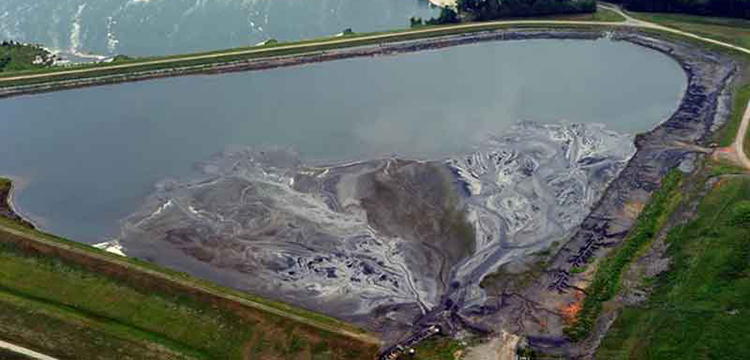
Coal Ash Basin
April 11. By Erica Batten. Duke Energy will appeal a state Department of Environmental Quality (NCDEQ) order that it must excavate the coal ash at coal power plants and rebury it in lined landfills. The Charlotte-based utility said the order to excavate nine ash basins would impose a financial burden on not only customers but the entire economy in both North Carolina and South Carolina.
Duke officials called the NCDEQ clean-up plan “the most expensive and disruptive closure option possible.” Duke said the costs would rise from less than $6 billion to as much as $10.6 billion.
Duke pointed out that the basins are rated “low risk” by the NCDEQ.
After weighing three different closure options for Duke Energy’s six coal-fired North Carolina plants, the state’s Department of Environmental Quality ordered the energy company April 1 to excavate its coal ash basins and place the waste in lined pits.
“We are excited and relieved that Duke Energy will finally have to clean up its coal ash mess,” said Drew Ball, state director of Environment North Carolina. “Gov. Roy Cooper and DEQ Secretary Michael Regan have taken a historic step and are standing on the side of the environment, public health and science instead of kowtowing to one of the most powerful corporations in our state.”
Nevertheless, Duke Energy is the backbone of the state’s economy, powering not just small business and industry but today’s digital economy and economic development efforts.
Duke said one of the reasons it is appealing is because the NCDEQ decision “lacked full consideration of the science and engineering. Duke said it will provide those details during the North Carolina Office of Administrative Hearings.
Of Duke Energy’s 14 coal-fired plants in North Carolina, Marshall Steam Station in Iredell County has more than a quarter of the total coal ash: 16 million tons in an unlined disposal pond and about 14 million more elsewhere on site.
By comparison, the municipal waste for the entire state is about 14 million tons per year, said DEQ Waste Management Division Permitting Branch Supervisor Ed Mussler.
The North Carolina Utilities Commission—which sets rates—will ultimately decide if Duke Energy is responsible for the cost of coal ash management.

Charles Knox
It’s not just cleanup costs that could impact consumers.
Charles Knox, founder of commercial Realtor The Knox Group in Huntersville, said if property values drop, “then everybody should have some claim against Duke for loss of value.”
“Property devaluation from water pollution is a gradual process that follows the progression of information on the extent and severity of a pollution event and news of how long the pollution is expected to persist,” said research biologist A. Dennis Lemly in a 2014 report about the Eden, N.C. coal ash spill into the Dan River in North Carolina and Virginia.
Lemly estimated the total cost of the spill’s damage to the environment, recreation and human health at $2.95 billion. This figure did not include property devaluation estimates.

Discussion
No comments yet.